Mark Stewart is the singer and a founding member of iconoclastic band The Pop Group, who reformed in 2010. He grew up in Bristol and, with The Pop Group, between 1978 and 1981, pioneered an abrasively different post-punk sound based on jazz, funk and hip hop, with a direct and vociferous political edge. Their output, especially their debut album Y and the single “We Are All Prostitutes”, remain hugely influential within alternative rock circles.
When The Pop Group split Stewart went onto work with Adrian Sherwood, Tackhead and the On-U sound stable, creating crushingly heavy music that amalgamated dub, industrial, hip hop and much else on seminal albums such as Learning to Cope With Cowardice and As The Thin Veneer of Democracy Starts to Fade, credited to Mark Stewart & the Maffia. Again, he had created a blueprint for much that was to follow on the noisy creative fringes of rock. He continued to record for Mute Records throughout the Nineties, never tempering his opinions or his sonic style and was celebrated in the 2009 documentary On/Off – Mark Stewart – from The Pop Group to the Maffia.
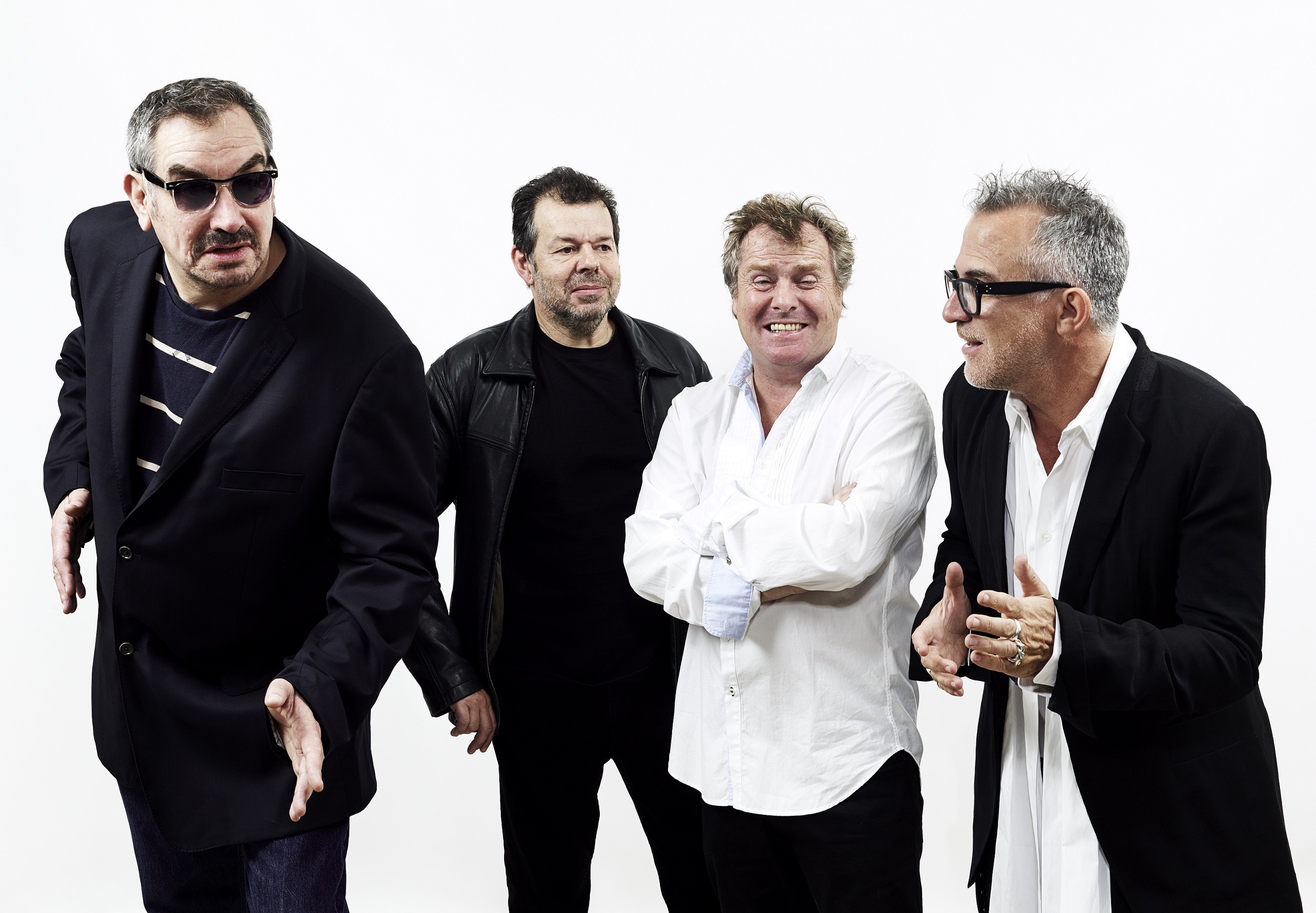 The Pop Group (right), now consisting of Stewart, Gareth Sager, Bruce Smith and Dan Catsis, have a new album, Citizen Zombie, produced by Paul Epworth. I meet Stewart in the basement bar of the Clapham Picturehouse. He is imposingly tall, around six foot six. He wears black trousers, a black shirt, a Lee jeans jacket with fawn corduroy collars, powder blue socks and light brown, slip-on winklepicker brogues (“Italian leather cowboy shoes”, as he terms them). His hair is full, in a short rocker-ish cut, dark but greying. His eyes are notably hooded but blue and intense. He immediately lives up to his reputation for obtuseness. He sips a herbal tea and disagrees loudly with everything that’s said by me or his female manager. He settles eventually and has an unexpected and contagiously juvenile sense of double entendre humour which makes him giggle, but initially he bridles when his manager talks about how Asia Argento directed the new Pop Group video for “Mad Truth”, and explodes when I mention the new album is surprisingly easy to digest, funkily poppy. His manager starts to agree but…
The Pop Group (right), now consisting of Stewart, Gareth Sager, Bruce Smith and Dan Catsis, have a new album, Citizen Zombie, produced by Paul Epworth. I meet Stewart in the basement bar of the Clapham Picturehouse. He is imposingly tall, around six foot six. He wears black trousers, a black shirt, a Lee jeans jacket with fawn corduroy collars, powder blue socks and light brown, slip-on winklepicker brogues (“Italian leather cowboy shoes”, as he terms them). His hair is full, in a short rocker-ish cut, dark but greying. His eyes are notably hooded but blue and intense. He immediately lives up to his reputation for obtuseness. He sips a herbal tea and disagrees loudly with everything that’s said by me or his female manager. He settles eventually and has an unexpected and contagiously juvenile sense of double entendre humour which makes him giggle, but initially he bridles when his manager talks about how Asia Argento directed the new Pop Group video for “Mad Truth”, and explodes when I mention the new album is surprisingly easy to digest, funkily poppy. His manager starts to agree but…
MARK STEWART: Who the fuck is this interview with? What the fuck? The funny thing was it would have been very easy for the Pop Group to make something like you’d find on the Diagonal label, completely out there, weirder than a Sunn O))) record, because we’re couched in that since the age of 11 or 12. Me and Gareth have been listening to and collecting some of the weirdest music you’ve ever heard of, but part of the point of the Pop Group, which people didn’t realise, is that we wanted to be a pop group. We formed in ’76 and punk was already going on. We thought there was no point in playing this pub rock like punk was. We wanted to bring all these different things into it. We put on Val Doonican jumpers and brushed our hair forward, just to be different, to counter what normal punks wore in ‘76.
THOMAS H GREEN: And you reckoned you were playing pop music?
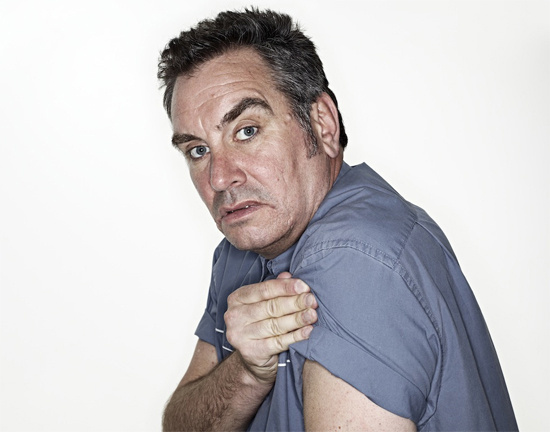 We thought we were but because we couldn’t play sometimes we were playing different songs from each other at the same time. These heavyweight journalists thought we were being deliberately obtuse. At the moment I think it’s really important for people with different ideas and ideals to engage with reality. Mates of mine in Germany and Holland are holier-than-thou, stand-alone punks who won’t deal with this idea because they think it’s all completely dirty - but then [what they’re doing] ends up as vanity publishing. I realised when I was 12 or 13 that if the New York Dolls hadn’t been on Mercury Records and got on the Whistle Test, I’d be working in a factory or some naff little office, so it’s really, really important people stand together and show there’s an antithesis, a nemesis to the X Factor zombification of society.
We thought we were but because we couldn’t play sometimes we were playing different songs from each other at the same time. These heavyweight journalists thought we were being deliberately obtuse. At the moment I think it’s really important for people with different ideas and ideals to engage with reality. Mates of mine in Germany and Holland are holier-than-thou, stand-alone punks who won’t deal with this idea because they think it’s all completely dirty - but then [what they’re doing] ends up as vanity publishing. I realised when I was 12 or 13 that if the New York Dolls hadn’t been on Mercury Records and got on the Whistle Test, I’d be working in a factory or some naff little office, so it’s really, really important people stand together and show there’s an antithesis, a nemesis to the X Factor zombification of society.
My favourite moments in pop history are when that happens, the KLF and so on.
The Pop Group were really that Situationist idea of an explosion at the heart of the commodity but when we broke up we were frozen in time as a position that’s been remembered as much as the music. That position is still completely true, the intense fight I’ve had my whole life to be completely independent and against censorship, but now we’ve got complete control of what we do, to quote The Clash. There’s no point in just standing on the sidelines saying, “You don’t want to do that,” like that Harry Enfield character. This year we’re going to be right in the middle of the machine but with our own label, our own tendrils of post-punk alternative society across the world letting us in through the back door. The effect of what we did back in the day - and friends of ours did - means there’s a generation of people who’ve bitten their lips and are now in really strong positions of power... in Google, on the electronic frontiers, even the guy who runs GCHQ is supposedly a big fan. The funny thing is now it’s not really them and us – it’s us! We’re not like kids anymore, standing there shouting, “You should do this,” on the sidelines at a football match, we’re actually responsible for the future.
Watch Asia Argento's video for "Mad Truth"
Your generation now has their hands on the levers of power. Was your Control Data album in 1996 the last time you made as much effort to interconnect and engage with the wider world of popular music?
That was, yeah, yeah. At that moment there was a lots of links between what I was doing and other people like Underground Resistance and Carl Craig, my dance mates in the States. I’ve always had a connection to that from when I was a kid. I was into dance music before punk. We dressed up in Fifties clothes and went dancing to funk with pink zoot suits on and plastic sandals. When we saw the Sex Pistols wearing mohair jumpers, these were the same clothes we were wearing to underground funk clubs. We thought, “Oh look, there’s someone who looks a bit like us.” It was the first time we’d seen anyone who looked a bit like us in any music magazine. Dr Feelgood were wicked but they didn’t look like us, they looked like somebody from On the Buses. There wasn’t anybody around. There was Slik in bowling shirts but no-one else that looked anything likes us.
Slik was Midge Ure before he was in…
… the Rich Kids [with ex-Sex Pistol Glen Matlock, future Visage member Rusty Egan and Steve New]
Yeah, he sneaked in the back door there.
Wahay! [Cackles a gleefully dirty laugh]
Was it dangerous to dress up differently in Bristol in the 1970s?
Bristol was always dangerous but being 6’6” by the age of 12 I was heavily engaged by all the local gangs. At that stage it was smoothies, just after suedeheads. Smoothies were suedeheads with a little feathery bit at the back, a bit like the girls’ haircuts in This is England. There was the Redland Aggro Merchants, the Horfield Boot Boys, my mate’s little gang was the King Smooth Boot Boys, KSB. Being really tall I started to go out clubbing when I was 11 or 12, hanging out with lots of older people. The local gangs really, really had it in for me. They wanted me to join their gangs but didn’t realise I was only 12. They thought I was about 20. So they’d smash all the youth club windows. I had to climb out of toilet windows. There was a bit of an etiquette in those days. You’d stand there, 12 people round you and loads of others down the road. If you hit them back they could get you. If you just stood there and took the punches it just freaked them out, they didn’t know what was going on.
When I was 12 my parents wouldn’t let me out like that. How come yours did?
Because I was bigger than my dad [cackles].
What did he do for a living?
He was a sort of engineer.
And your mum?
She was one of the earliest child-minders, then she started looking after kids with learning disabilities.
So they let you have a lot of freedom.
I have a brother who’s two or three years older than me. He was going out a lot.
So they just let you both get on with it?
Yeah, yeah, they couldn’t really do anything else. My dad’s pretty out there. He’s into all sorts. My nan was a clairvoyant so my dad was into loads of what you would call occult stuff. He’s a Templar and he thinks he’s found the Philosopher’s Stone. He’s obsessed with the Stuart history, the Royal Jacobite Society – nonsense really. Every Sunday I’d go to table-rapping sessions with my nan. She was in the English spiritualist church, Madam Blavatsky sort of stuff. That period is really interesting to me as well, Yeats, the original Golden Dawn, really cool...
So you grew up with your family into all this esoteric…
What people don’t understand with the Pop Group is, to use a stupid word, the magical side of it. This isn’t magic in the sense of hobgoblins or whatever. It’s more like alchemy. With punk and post-punk, with bands like Alternative Television and Joy Division, there was this idea of being an anti-star, the band was no more important than the audience. I remember at early Throbbing Gristle concerts you’d meet people in the crowd like [filmmakers] Derek Jarman or John Maybury, really interesting people. This last Pop Group tour across England – the first proper Pop Group tour across England! – you’d see these people, whatever age, checking each other out. This writer Hakim Bey talks about temporary autonomous zones. You set it up and people make these little networks. When we were kids we made networks with [alt-culture magazine] RE/Search and all the [William] Burroughs crew, [Allen] Ginsberg. I remember sharing a house with Geoff Travis when he was just starting Rough Trade [Records]. Through these connections across the world – Matt Groening from The Simpsons, he’s a massive fan – you realise there’s this alternative reality of free-thinkers inventing the future, especially in the digital domain. These old, medieval ideas of government and nation state were obliterated by the corporations anyway. Now, with these digital domains and digital golems there’s room for free expression and new thought.
Listen to "We Are All Prostitutes"
So, in relation to that, what happened when the idea of reforming the Pop Group came up?
I treated it as a new commission. The year before I was doing these projects with Kenneth Anger, Richard Hell, some weird artists. I was treating these things as commissions, making something with somebody else. I thought, “Right, I’m going to treat [the reformation of the Pop Group] as a new commission, everybody using their best skills.” We all went into this thing completely and utterly open-minded. None of us wanted to make another Pop Group album or go back on something. We’re all so obstreperous and opinionated it would become a fist fight. What you don’t want is anybody to become a "yes" man. What you get when our four characters come together is something completely different. I feel exactly the same as when I was 14 but the only thing I’ve learnt with age is to stand back and when something starts happening, to let it happen. See how many heads this snake grows before you try to control it. That’s the magic, these sparks of letting something happen. It’s like letting a kid grow freely. I’m using the Pop Group to transmit or channel energy to other people.
Some of your ideas about communication are similar to Noam Chomsky’s – are you a fan of his work?
Some of it, yeah, and Edward Said. I’m a theory slut. I’m more into semiotics. I read a lot of [Sylvère] Lotringer, [Jean] Baudrillard, and I’m really into [19th-century poet Stéphane] Mallarmé’s concept of misreading at the moment. I was just reading some [Michel] Foucault on holiday. I like it when you read a text and think, “What the fuck’s that?” Then you read it again. It’s like a haiku, like a song you can hear in multiple different ways.
Listen to "As the Thin Veneer of Democracy Starts to Fade"
What’s your earliest memory?
Being in a pram and a lady reaching over and wiping my face with a dirty hankie with lipstick all over it. I remember seeing the Rolling Stones and [Rudolf] Nureyev on Sunday Night at the Palladium with my great auntie who lived with us, on her black and white TV. I thought Nureyev was more interesting than the Stones. Thank God I didn’t become a ballet dancer.
You once did a version of “Jerusalem” with the Maffia. Tell us about your relationship with the work of William Blake.
That’s psychic. That’s the most psychic thing that’s happened for the last few years. For the last three days I’ve had some very strange intersections with William Blake. For example, my son came over from Spain. We went to the Tate Britain and suddenly there was this arrow to the Blake Room. I was a bit knackered. I’d been walking around showing my son all the sights. I’d been to so many Sports Directs I couldn’t look at any more trainers. Suddenly there’s these lithographs – or however he did that metal printing – images I’d been looking at since I was a kid. There was this bald-headed golem thing and I said to my son, “Look, that’s me, that’s Dad, that’s how I feel.” He laughed his head off. Then we came out of there and I was taking him through Soho, showing him my old stomping ground, different pubs and clubs we used to go to - Gossips, The Wag. I took a wrong turn and suddenly, just behind where the old NME was, there was William Blake’s house where he’d created those images. For me Blake is the English dissident.
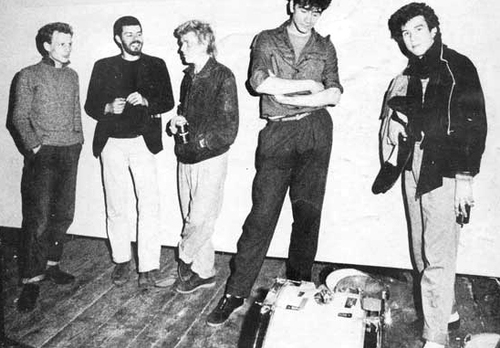 [He talks tangentially - rather than readably – through the Pop Group’s involvement with the Campaign Against the Arms Trade, the last time he saw Tony Benn, the fact Tony Benn was once his local MP in Bristol, his disillusion following behaviour he saw writing a fanzine on the Sex Pistols’ notorious Anarchy Tour, and the resurgence of the extreme right. The last of these leads him to talk about class and racial divisions in Bristol when he was growing up. He says he knew people of all kinds of radical political persuasions]
[He talks tangentially - rather than readably – through the Pop Group’s involvement with the Campaign Against the Arms Trade, the last time he saw Tony Benn, the fact Tony Benn was once his local MP in Bristol, his disillusion following behaviour he saw writing a fanzine on the Sex Pistols’ notorious Anarchy Tour, and the resurgence of the extreme right. The last of these leads him to talk about class and racial divisions in Bristol when he was growing up. He says he knew people of all kinds of radical political persuasions]
People on both sides of the fence?
There was no fence. The fence was Rovers and City. A large amount of nutters came to the first punk gigs in Bristol. We set up this thing in the Barton Hill Youth Centre in Bristol. It was one of the roughest places. An interesting thing about Bristol is it's small. When the hip hop thing kicked off there was only one club. We’d all go to the Dugout. There’s none of this class divide, we don’t see colour down there. My uncles were merchant sailors. My mum came in from the country, from this little town just outside Bristol. She moved into the city for the cheap housing. A few years later Bristol Omnibus set up a recruiting station in Jamaica because they were short of labour. My granddad loved all the Jamaican guys because they had nice suits on and they bothered to polish their shoes. The local navvies didn’t. He called them gentlemen. Journalists see the influence of reggae on Bristol from an American or London viewpoint, a whole anthropological perspective, whereas my mum lived in the street where the blues dances were. It’s not some intellectual thing.
There is, per force, a big difference between the experience of actually being in a time and place and the media representation of it. There’s a gap…
They’re imposing a gap! They’re imposing a gap!
The avant-jazz cellist Tristan Honsinger played on the Pop Group’s most renowned song, “We Are All Prostitutes”. Do you still maintain contact?
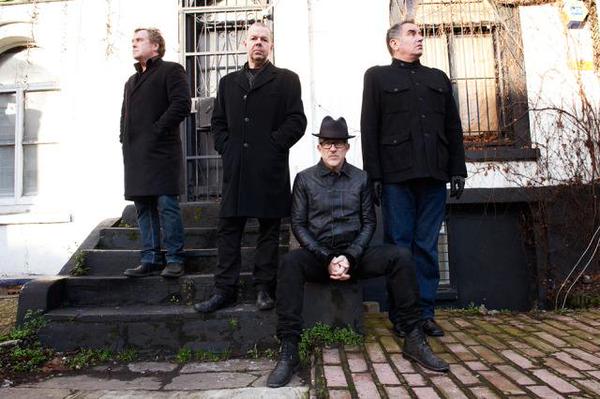 Gareth has links and Bruce has done a lot of work with Don Cherry and the Watts Prophets. I saw [British experimental musician] Steve Beresford recently but I haven’t seen Tristan for ages. The interesting thing is hopefully Cecil Taylor is opening for the Pop Group in New York and he is absolutely the fucking best surviving free jazz person, a completely out there improvisational guy. He’s even better than Sun Ra. Cecil spooked out John Coltrane and Albert Ayler - and Albert Ayler is the man for the Pop Group. The influence of the free jazz stuff… I remember just up the road from me when I was growing up was my best mate Jay [Jeremy Valentine] who was in The Cortinas - they were the first Bristol punk band - but on the other side of the road was another mate of mine from primary school called Mark Singer who started to play piano at the age of 11 or 12. Fighting in the middle of the road, either side of the boot boy divide, then going and listening to our mate play mental free jazz piano. That’s what Bristol’s like. In Germany art is all mixed up like that but in England you get this kind of Melvin Bragg art divide – art is this, but this isn’t art.
Gareth has links and Bruce has done a lot of work with Don Cherry and the Watts Prophets. I saw [British experimental musician] Steve Beresford recently but I haven’t seen Tristan for ages. The interesting thing is hopefully Cecil Taylor is opening for the Pop Group in New York and he is absolutely the fucking best surviving free jazz person, a completely out there improvisational guy. He’s even better than Sun Ra. Cecil spooked out John Coltrane and Albert Ayler - and Albert Ayler is the man for the Pop Group. The influence of the free jazz stuff… I remember just up the road from me when I was growing up was my best mate Jay [Jeremy Valentine] who was in The Cortinas - they were the first Bristol punk band - but on the other side of the road was another mate of mine from primary school called Mark Singer who started to play piano at the age of 11 or 12. Fighting in the middle of the road, either side of the boot boy divide, then going and listening to our mate play mental free jazz piano. That’s what Bristol’s like. In Germany art is all mixed up like that but in England you get this kind of Melvin Bragg art divide – art is this, but this isn’t art.
Interview continued overleaf
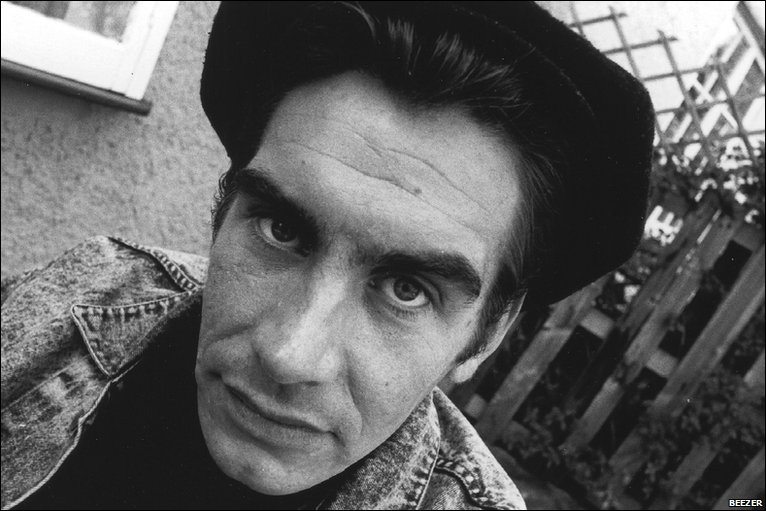 What is your first memory of Fats Comet, the Sugarhill house band who went on to become Tackhead?
What is your first memory of Fats Comet, the Sugarhill house band who went on to become Tackhead?
I have a CD here of new material from them. This is an interview about the Pop Group so I’m not supposed to be talking about that but it’s still going on.
I’m just here to talk about your whole life really.
The trajectory was this. The Pop Group were going to New York a lot. We were really in the middle of the No Wave scene in New York. We were out there all the time playing Tier 3, Danceteria, the Mudd Club, doing all these weird PBS public TV stations, hanging out with Fab 5 Freddy, Basquiat, Vincent Gallo in his breakdancing days. Thurston Moore of Sonic Youth came to see us with DNA supporting at Tier 3. So the Pop Group were in New York a lot. We turned on a little ghetto blaster one night and heard these drum beats going. They sounded like Metal Machine Music by Lou Reed, they sounded like pile-drivers going. I thought, “What the fuck’s this?” Then this guy comes on and starts rapping. I’d heard one rap record at that point - by Spoonie Gee – rap was only just starting. It was [Kool DJ] Red Alert’s very early [Kiss FM] show with loads of scratching and stuff. We got our roadies to stay in every night and record this show. We took these cassettes back to Bristol and everybody copied them on their double cassette ghetto blasters. Delge [Robert del Naja], later on of Massive Attack, drew on each one and made little labels.
So that’s how you came across hip hop, but what about Tackhead?
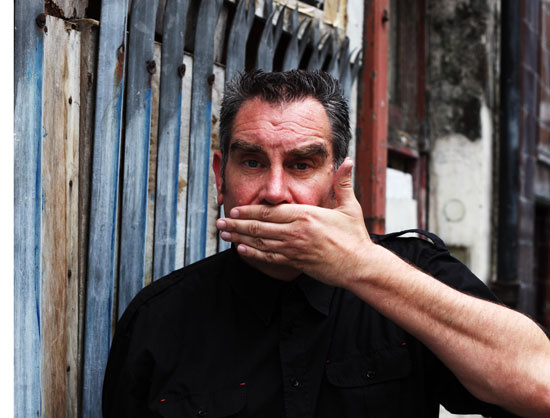 As soon as the Pop Group finished I started working with Adrian Sherwood. The name Tommy Boy Records kept coming up, a label making noises we liked. There was this thing called an AMS that was just a jack plug where you could trigger a noise [the loop facility of the AMS DMX1580 digital delay]. It acted like a sampler. We tried that. Adrian went to Midem in the south of France, he was trying to push On-U Sound early on, getting licencing deals. He ended up by chance in a kiosk opposite Tommy Silverman of Tommy Boy Records. He rang me up and said, “That bloke you keep going on about is here.” I said, “Can you go and ask him if he knows Keith Leblanc?” He said, “Yeah, he says he just made this Malcolm X track, 'No Sell Out'.” I was going, “Adrian, go for a drink with him or something.” Tommy was interested in the English scene, in [female reggae act] Akabu [who later recorded the single “Watch Yourself” for Tommy Boy]. We made the connection, tracked down Keith, Doug Wimbish, Skip McDonald [AKA Tackhead]. These were the guys. I knew their stuff. They made “Push Push in the Bush” [Wimbish and McDonald were part of producer Patrick Adams’ disco outfit Musique who recorded the single “In the Bush”], all the early Sugarhill stuff, Tommy Boy’s stuff, these are the guys that were cutting the rhythms. I just thought, “Bloody hell, let’s have a bit of this,” so we flew them over. I had this gig at the Electric Ballroom but they turned up in these studded armbands, looking like KISS, like early Grandmaster Flash videos, wearing lycra and Jheri curl perms. I ruffled their hair and bought them clothes from a charity shop. We experimented with their music from then on.
As soon as the Pop Group finished I started working with Adrian Sherwood. The name Tommy Boy Records kept coming up, a label making noises we liked. There was this thing called an AMS that was just a jack plug where you could trigger a noise [the loop facility of the AMS DMX1580 digital delay]. It acted like a sampler. We tried that. Adrian went to Midem in the south of France, he was trying to push On-U Sound early on, getting licencing deals. He ended up by chance in a kiosk opposite Tommy Silverman of Tommy Boy Records. He rang me up and said, “That bloke you keep going on about is here.” I said, “Can you go and ask him if he knows Keith Leblanc?” He said, “Yeah, he says he just made this Malcolm X track, 'No Sell Out'.” I was going, “Adrian, go for a drink with him or something.” Tommy was interested in the English scene, in [female reggae act] Akabu [who later recorded the single “Watch Yourself” for Tommy Boy]. We made the connection, tracked down Keith, Doug Wimbish, Skip McDonald [AKA Tackhead]. These were the guys. I knew their stuff. They made “Push Push in the Bush” [Wimbish and McDonald were part of producer Patrick Adams’ disco outfit Musique who recorded the single “In the Bush”], all the early Sugarhill stuff, Tommy Boy’s stuff, these are the guys that were cutting the rhythms. I just thought, “Bloody hell, let’s have a bit of this,” so we flew them over. I had this gig at the Electric Ballroom but they turned up in these studded armbands, looking like KISS, like early Grandmaster Flash videos, wearing lycra and Jheri curl perms. I ruffled their hair and bought them clothes from a charity shop. We experimented with their music from then on.
What were the origins of the Pop Group’s interest in funk rather than straightforward punk sounds?
 At 13 or 14 I heard about this crazy downtown club from my older mates who I thought were cool with their slicked-back hair. I needed someone to get me into this club. Mark Joseffiat was Vernon’s little brother. Vernon was like James Dean, the coolest guy ever. I made mates with him later on. We’d go round looking for winklepickers in these broken down old shoe shops in the suburbs. He’d be going up to Malcolm McClaren’s first shop, Let It Rock, and buying Fifties clothes years before punk, coming back on a Saturday and wearing them down to this club called Fosters. The DJs down there were playing the heaviest ultra-funk, early Undisputed Truth, this band called the KGs which were a split-off from early Kool & the Gang, tearing basslines, everyone doing this mad monkey dancing, flipping out. The atmosphere in there was absolutely brilliant. I walked in there and it blew my head – black, white, whatever, this is really great, everybody cool and bothering about clothes.
At 13 or 14 I heard about this crazy downtown club from my older mates who I thought were cool with their slicked-back hair. I needed someone to get me into this club. Mark Joseffiat was Vernon’s little brother. Vernon was like James Dean, the coolest guy ever. I made mates with him later on. We’d go round looking for winklepickers in these broken down old shoe shops in the suburbs. He’d be going up to Malcolm McClaren’s first shop, Let It Rock, and buying Fifties clothes years before punk, coming back on a Saturday and wearing them down to this club called Fosters. The DJs down there were playing the heaviest ultra-funk, early Undisputed Truth, this band called the KGs which were a split-off from early Kool & the Gang, tearing basslines, everyone doing this mad monkey dancing, flipping out. The atmosphere in there was absolutely brilliant. I walked in there and it blew my head – black, white, whatever, this is really great, everybody cool and bothering about clothes.
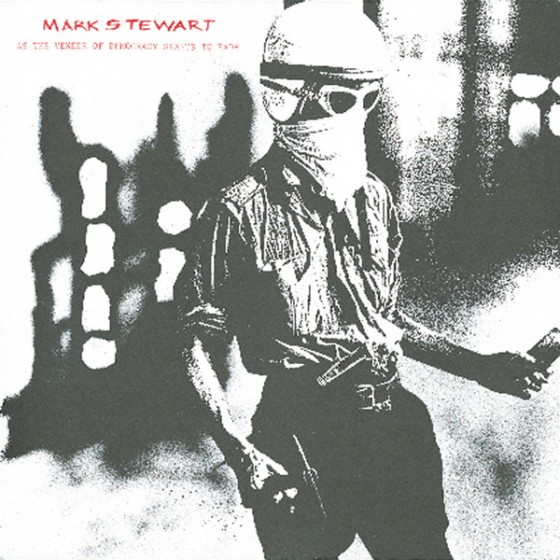 Clothes and buying clothes were as big a part of it as the music?
Clothes and buying clothes were as big a part of it as the music?
I got into music for the clothes when I was a kid. Seeing Alvin Stardust, I thought you could just stand onstage with a leather glove on and point and not have to go to work in a fucking factory. So that style thing is really crucial to us, it’s about definition - Jon Savage gets it. People go on about the music but that whole thing is about identity, becoming your own person… Well, I convinced my mum and dad I wanted to go to museums in London. There was a place called Acme Attractions in the basement of Antiquarius of the Kings Road. I went in there. Don Letts was sat on a scooter and Jeanette [Lee], who became Gareth’s wife [and also managed PiL and, later, Rough Trade Records], was dressed in a Beatles outfit selling Sixties stuff behind the counter. Me and my mate would walk up and down Kings Road. We once got stopped by Manolo Blahnik and asked to be in a Vogue shoot. At the same time there was a clothes shop in Bristol called Clobber which changed its name to Paradise Garage. It was run by the saxophonist from the Welsh band Amen Corner, Allan Jones, and he was best mates with Lloyd Johnson who ran [rock’n’roll boutique] Johnson & Johnson in Kensington Market. Allan was buying stock off Johnson, off ACME Attractions, off McLaren’s Let It Rock, and off this other place called 20th Century Fox - the Bowie pegs, zoot suits, and so on. Allan was cool as hell so I used to knock off school and go in Clobber and hang around. I was trying to get this band going. We were going to be called the Wild Boys after the Burroughs thing. We were going to come out of dustbins at the youth club in Westbury-on-Trym dressed in binbags. That was the start…
How did you get Paul Epworth involved in producing the new album?
Way back, I heard this thing called Phones. It was Paul’s tiny little English abstract hip hop project when he was a kid. I kept on checking his name, his underground stuff. I didn’t really check his overground stuff [Adele, Coldplay, U2]. Suddenly he was the biggest producer in the world and Gareth saw this interview where he was saying that the Pop Group and some of mine & Adrian’s productions blew his mind and changed the way he saw things as a kid. We were getting a plan together to make a big impact. We’re quite arrogant, quite punk in the way we work. I asked him on Twitter, “How do you fancy doing the new Pop Group record?” He came back ten seconds later and said it’d be a complete and utter honour. Suddenly we’re in the best studio in the world with all these engineers in coats like George Martin with The Beatles. But me and Gareth are plugging it all in backwards and turning everything upside down. Paul is like my lovely little brother. We’d been writing the songs for a while but we were in the studio for six weeks, no expenses spared.
What is the song “S.O.P.H.I.A.” from the new album about?
It’s like “She is beyond Good and Evil”. There’s a way of using a love song as a Trojan Horse, putting sugar on the poison to invade people’s minds. On the surface, it’s about if I’d only loved Sophia. There was a girl called Sophia at the Dugout. You’d see her in a certain light and she’d look like a pre-Raphaelite idyll. She was a lovely girl. There is that longing. I was going to call the album The Last Romantic as it’s about longing and dreaming of a better world. I got this idea about having unconditional love for the whole planet, to try and make some kind of change instead of just loving one object, moulding it to be your little pet or somebody trying to do that to you. For me love is a political act.
What is the song’s alternative meaning?
The Knights Templar are very, very interesting. When the Romans left England went into the dark ages but the Muslims protected a lot of the old knowledge from Greece - sacred geometry, mystical ideas, science, mathematics. The Knights Templar were this band of gentry who took these vows to give everything up and serve higher causes. Through the Templars this old well of knowledge came back into Europe and the Renaissance happened. The Pope really hated them because they set up this early banking system, they were autonomous and open-minded and, in those days, to be open-minded was to be heretical. The Pope clamped down on that straight away, like they did with [16th Century cosmologist Giordano] Bruno and the alchemists. When the inquisition tortured the Templars they went on about how they worshipped Baphomet. The inquisition presumed Baphomet to be some nonsensical multi-headed spider. This guy who translated the Dead Sea Scrolls [Dr Hugh Schonfield] put this thing called the Atbash cypher onto the word “Baphomet” and it spelled out “Sophia”, which is this old concept of female wisdom. Supposedly the Templars were protecting the old idea of female wisdom which, as soon as Christianity became an implement of Roman state control, had been stamped out.
Watch the video for "She is Beyond Good and Evil"
Talking of “She is Beyond Good and Evil”, the original version was produced by Roxy Music’s Andy Mackay. It went unheard until last year’s Cabinet of Curiosities compilation. How did you come to be working with Andy Mackay and how did you track down that piece of music?
There is this this lost period in English rock’n’roll and teenage history – 1971 to 1975. I was formed in those years. There was this band called Cockney Rebel who dressed up as “droogs” from A Clockwork Orange. When they came to Bristol, when I saw them, it was as shocking as the Sex Pistols. Seeing Roxy Music do “Pyjamarama” – me and my mate followed them on the whole tour, knocked off school, slept in train stations. Andy Mackay was the coolest one in Roxy. We were getting into Sha Na Na and Andy had a teddy boy’s drape coat on, he had one of those lovely gunslingers’ waistcoats, Andy was the man, cooler than Bryan Ferry, cooler than Eno. Andy brought out these solo albums, doing sax versions of “Ride of the Valkyries”. It was so preposterous. Andy was my style icon. There’s the arrogance of power but the early Pop Group had the power of arrogance. We had these meetings at school lunch breaks about who was going to produce us. We hadn’t even done many gigs. We just immediately considered ourselves the best thing, everyone else could fuck off – “lout culture” we called it. We flew John Cale in and he passed out in a meeting I went to in my school lunch break. I tried to get King Tubby but he got shot. Someone suggested Andy Mackay so we did some early sessions with him. Me and Gareth spent ages tracking that lost music down, dealing with fan sites in America, with Edwyn Collins, round people’s houses – here, there and everywhere. One day we found the Andy Mackay session of “Beyond Good and Evil” which we hadn’t heard since we left the studio.
Watch the Pop Group perform "Where There's a Will" on Belgian TV in 1980
How have you managed to remain afloat financially over the years?
I do alright. Right across the world, there’s enough people. The solo stuff is big. It’s mad. We’re not extravagant and we control what we do, get a big whack because we run it. We own 80%. Thank God we never ended up taking capital from anywhere else because you get ripped off, you end up not being able to control your own material which is awful.
You have lots of interesting ideas about the interweaving ways we relate to reality. This has led to conjecture in the media about your mental health. People make out you’re a nutter. What do you make of that?
It kind of helps sometimes, like a Syd Barrett situation. I should play it up and become the outsider. That sort of thing makes the myth. The truth is, though, that I can trace it back. When we were kids I did an interview. I’d been down on the south coast on the beach and somebody had been doing land-sea helicopter rescue training. I came up to Bristol and some journalist from the NME or somewhere comes down. I took them to a cider pub. I think it was the first time they’d drunk really rough cider. They said, “What have you been doing today?” I said I’d just been watching all these helicopters. The next month I had to do some gigs in Japan and I hadn’t read the resulting article. These interviewers kept asking, “Mark, are you alright? Where are the helicopters?” I said, “What helicopters?” This guy who’d come to Bristol had got it all muddled up. Sometimes I speak ten-to-the-dozen, I get excited and people can’t follow what I’m saying. He’d been drinking cider too and he’d become confused. There are these black helicopters in conspiracy theory, these non-aligned black sites. I know about this crazy stuff, para-politics, I read counter-intelligence reviews, trying to get as up-to-date as possible with all the different points of view. He’d written that I thought I was being followed around by black helicopters. Perhaps the tape got mangled. A bit later on an American friend of mine wrote this book called The Global Manipulators, [The Global Manipulators - the Bilderberg Group, the Trilateral Commission, Covert Power Groups of the West by Robert Eringer]. Nowadays there are TV programmes about this sort of thing but back in the Eighties it was regarded as conspiracy theory. When I spoke about it and said, “This isn’t a conspiracy theory, this is real politics,” they’d say, “You’re mad. Why are you talking about that? You’re paranoid.” Even when I was talking about Pol Pot it was, “Shut up, Mark, what are you going on about that for?”
They were pathologizing ideas that didn’t fit in their nice consensus media reality.
They’d just make excuses. What the fuck? I made a record called How Much Longer Do We Tolerate Mass Murder? and put pictures on the cover from John Pilger’s report on Pol Pot. Is that paranoia?
Do you like techno?
I’m very, very keen on electro. There’s this kiddie called Dave DMX I like and maybe we’ll get Man Parrish to play with us in the States. In that hip hop period I was really into the electro side of it. There was this girl called Shannon who made “Let The Music Play”. Also I loved this LA label called SOLAR, the Sound of Los Angeles, electronics mixed with funk, and there was Cymande, a synth guy. I love Underground Resistance. I was just doing something for Aux 88. The interesting thing is techno and its offshoots are very strong across the world at the moment. There’s this crew called Crookers who did this remix of “We Are All Prostitutes” that went absolutely mental. I like going out dancing, You’ll see me with my head in the bass bin in mad clubs across the world.
Watch a fan video for "Learning to Cope with Cowardice"
What are your feelings about Gary Clail, who achieved chart success on On-U Sound with the kind of music which you pioneered?
I did help there and I was very pleased. The whole thing was it was our crew, our gang, the Dugout in Bristol, innit. I helped Tricky on his first tune, Smith & Mighty were on one of my tunes, Adrian’s working with Pinch now. There’s a kid called Echoplex who’s really interesting on Planet Mu, my favourite label.
Do you have fond memories of the On-U Pay It All Back tours?
It’s really sad - one of our drummers, Style Scott from Dub Syndicate, got shot dead in Jamaica just before Christmas. Bonjo Iyabinghi Noah [from African Head Charge] is still about.
They were both members of your original Maffia…
Charlie Fox was the original drummer but Style Scott played on a lot of sessions.
As you’ve developed as a writer and musician, when you listen to old tunes such as “The Paranoia of Power”, do you find them trite?
No, not at all. You start to see things second hand on Twitter, discussing some of your work, you see the influence things have on other people. I just do it for my own pleasure. Like a little kid sat on the floor trying to get a round brick in a square hole. I’m doing it to be obstreperous, probably get told off by my mum, I’m doing it because I shouldn’t. There’s this lyric, “Impossible princess, you threw all your toys out of the pram, you did it just because you can.” Hopefully we can create big media events with punk outrage spirit – a provocation…
Watch the trailer for On/Off – Mark Stewart – from The Pop Group to the Maffia
What are your thoughts on electronic body music and industrial music? Musicians from that world often pay tribute to your music?
I don’t understand it. Somehow these experiments I’d been doing with these pile-driver beats I’d originally heard in New York with the Pop Group, and which I’d tracked down and got Keith Leblanc to put in another context, somehow they had an effect. It’s often about disrespect for context that allows you to invent three genres in the same song. On that album As the Thin Veneer of Democracy Starts to Fade, supposedly I invented industrial, trip hop, blah, blah blah, but if someone runs off with one of my ideas and makes a whole genre out of it, it’s really nothing to do with me. But having someone like Trent Reznor on your side and constantly talking about you – or Massive Attack – what can you say? I’m pleased.
What are your feelings about the heritage music industry?
Andy Williams had this whole town, Branson [Missouri], which had four or five theatres. He and The Osmonds would just work there the whole day doing matinees. People would go for their holidays and see all their favourite bands from that period. I don’t really understand what “heritage” means in this context. I don’t really see myself as a musician and I don’t really see myself in that world. I spend most of my time with people I grew up with who are carpet-fitters or whatever, or my family. I don’t hang around with a lot of musicians. I find them really annoying, to tell the truth, and ignorant people. However, what is interesting is All Tomorrow’s Parties. What Barry [Hogan] curates is really cool and interesting. He gets another generation of kids coming and having their minds blown. When I was a kid I used to go the North Sea Jazz Festival and see Sun Ra and Ornette Coleman. It was like someone unscrewed my brain like a baked bean tin and let the stars out. When Matt Groening from The Simpsons was asked to curate All Tomorrow’s Parties, his wish list was for Iggy to reform the Stooges and me to reform the Pop Group. I was in Berlin and was toying with the idea anyway. What’s interesting is if you can use something that’s already yours as a channel…
Why is Lord Kitchener on front of the new album Citizen Zombie?
When I first came up to London there was a boutique on Piccadilly roundabout called Lord Kitchener’s and it had an appropriated image of him. On my mother’s life, I really want the Pop Group to be a battering ram to get across some ideas I’ve had and some I’ve magpie’d from other sources. It’s got be a strong message: Your country needs you not to be a zombie; your children need you not to be a zombie. It’s about pointing the finger. Humans wake up.
Are there any other artists from Bristol that you don’t think have received the appreciation they deserve?
Most people from Bristol have had a lot of kudos, haven’t they? Apart from me [Laughs heartily]!
Listen to the song "Citrizen Zombie"



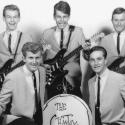
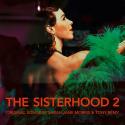
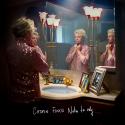


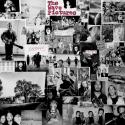






Add comment